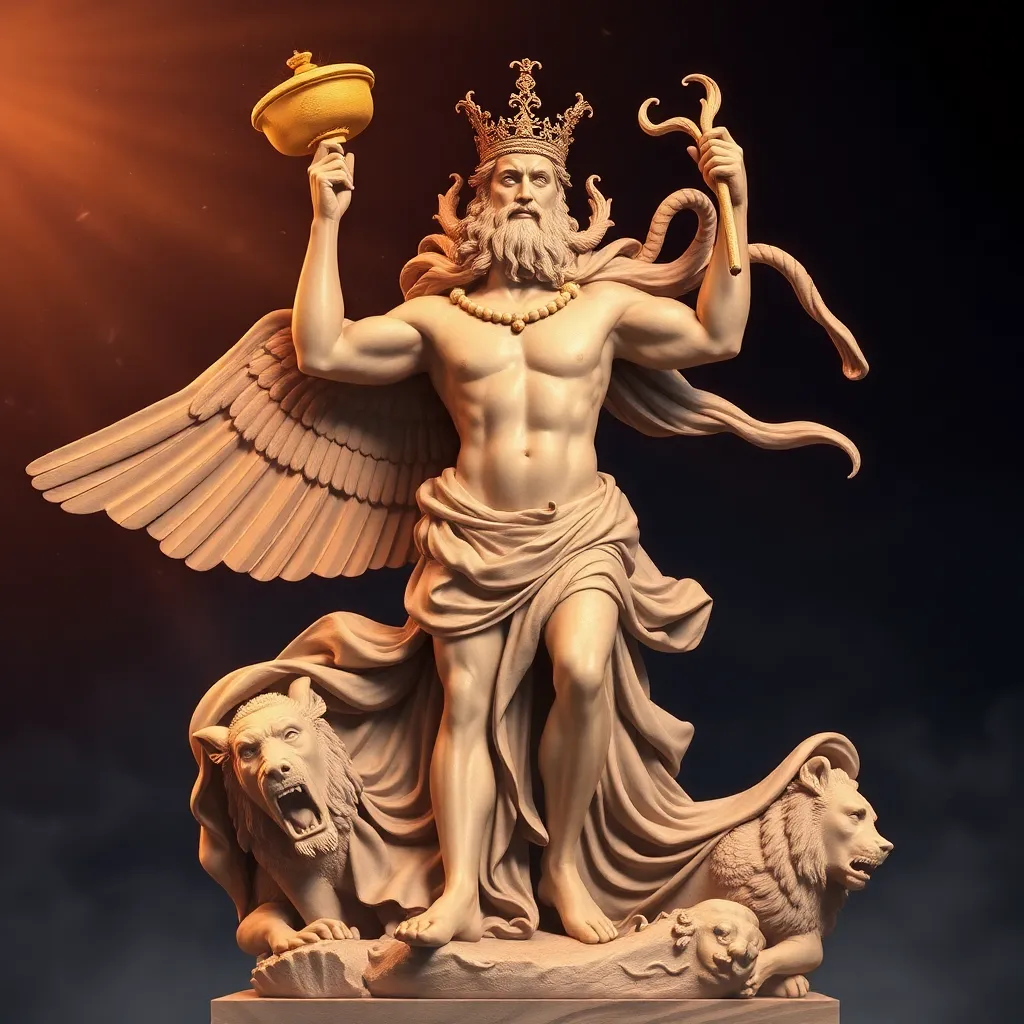Dionysus and the Theme of Duality in Greek Mythology
I. Introduction
Dionysus, the Greek deity of wine, festivity, and ecstasy, occupies a unique position in the pantheon of Greek mythology. Known for his dual nature, he embodies the complexities of human emotion and experience. In mythology, duality represents the coexistence of opposing elements, a theme that resonates deeply within the stories and attributes of Dionysus.
This article aims to explore the duality embodied by Dionysus, examining his origins, myths, and cultural significance, alongside the broader implications of duality in human nature as depicted in Greek mythology.
II. The Mythological Background of Dionysus
Dionysus, also known as Bacchus in Roman mythology, is often associated with the vine and wine. His birth is steeped in myth; he is the son of Zeus and Semele, a mortal woman. When Semele, tricked by Hera, demanded to see Zeus in his true form, she was incinerated by his divine light. Zeus saved the unborn Dionysus by sewing him into his thigh, a symbol of rebirth and immortality.
Key myths associated with Dionysus include his journey to spread the cultivation of vines, encounters with various figures such as Pentheus, and the famous tale of his capture and escape from pirates who failed to recognize his divinity. These stories highlight his role in both civilization and the wild, showcasing his cultural significance in ancient Greece, where he was revered in festivals such as the Dionysia.
III. The Dual Nature of Dionysus: God of Wine and Madness
Dionysus is celebrated as the god of wine and festivity, embodying joy, pleasure, and the celebration of life. Wine is often viewed as a means of liberation, allowing individuals to transcend their ordinary experiences and connect with the divine. The ecstasy associated with Dionysian celebrations is a vital aspect of his worship.
- Connection between wine and ecstasy: Wine loosens inhibitions, fosters community, and ignites creativity, making it a tool for expressiveness and celebration.
- Darker aspects: However, this ecstasy can quickly transform into madness. Dionysus is also known for inciting chaos and destruction, as seen in the myths of those who defy him, leading to tragic consequences.
IV. The Duality of Order and Chaos
The festivals dedicated to Dionysus often serve as a space where societal norms are temporarily suspended. During these times, participants engage in revelry that challenges the established order, allowing for a temporary embrace of chaos. This duality is essential to understanding the nature of Dionysian worship.
- Dionysian festivals vs. societal norms: The Dionysia featured theatrical performances, music, and dance, all of which provided an outlet for the primal instincts that civilization typically suppresses.
- The role of the Maenads: The Maenads, female followers of Dionysus, symbolize this wildness. They are depicted as frenzied and ecstatic, embodying the unrestrained aspects of nature and femininity.
- Tension between civilization and primal instincts: The dichotomy of order and chaos is central to understanding human nature, emphasizing the need for balance between societal expectations and innate desires.
V. Gender and Duality in Dionysian Worship
Dionysian myths also illustrate the fluidity of gender. Dionysus himself defies conventional gender roles, often portrayed with both masculine and feminine characteristics. This duality is reflected in the worship practices surrounding him.
- Representation of masculinity and femininity: Dionysus embodies traits of both genders, challenging traditional views of masculinity and femininity.
- Fluidity of gender: The Maenads, who are integral to his worship, also represent a blending of gender roles, often depicted in ecstatic states that transcend societal norms.
- Impact on contemporary understandings of gender: Dionysian worship raises questions about gender identity and expression, echoing modern discussions on gender fluidity and the spectrum of human experience.
VI. Artistic Representations of Dionysus and Duality
Dionysus has been a significant figure in ancient art and literature, often depicted in ways that highlight his dual nature. His representation in various forms continues to influence artistic expression today.
- Dionysus in ancient art: From vase paintings to sculptures, artists have portrayed him surrounded by vines, with a cup of wine, often accompanied by his followers, the Maenads and satyrs.
- Portrayal of duality in plays: In Euripides’ “The Bacchae,” the tension between order and chaos is brought to life through the character of Pentheus, who represents rationality and control, ultimately undone by his inability to accept the chaotic force of Dionysus.
- Modern interpretations: Contemporary adaptations of Dionysian themes resonate with today’s audiences, exploring the dualities of pleasure and pain, sanity and madness, reflecting ongoing human struggles.
VII. The Legacy of Dionysus: Duality in Modern Contexts
The influence of Dionysus extends beyond ancient texts and art into contemporary culture and psychology. His duality serves as a lens through which we can examine the complexities of the human experience.
- Influence on contemporary culture: Dionysian themes can be found in modern literature, film, and music, illustrating the enduring nature of his legacy.
- Relevance of duality in modern narratives: Stories that explore the balance between joy and despair, freedom and constraint, echo the dual experiences embodied by Dionysus.
- Dionysus as a symbol of the human experience: He represents the multifaceted nature of humanity, where joy and suffering coexist, prompting reflection on our own dualities.
VIII. Conclusion
Dionysus stands as a powerful embodiment of duality in Greek mythology, representing the myriad complexities of human nature. His stories reflect the intrinsic balance between order and chaos, ecstasy and madness, and the fluidity of gender. As we explore the significance of duality in Greek mythology, we gain insight into the enduring legacy of Dionysus and his relevance in understanding the human condition.
Through the lens of Dionysian mythology, we are reminded that the dualities within us are not merely contradictions, but rather essential aspects of our existence that enrich our understanding of life.




